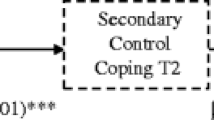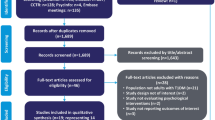Abstract
Background
The aim of this review was to summarize and identify the variations in the effectiveness of psychological interventions on adherence, metabolic control, and coping with stress in adolescents with type 1 diabetes (T1D).
Methods
An electronic search of literature was performed using PubMed (NLM), Embase (Ovid), CINAHL Plus (EBSCOhost), PsycINFO (Ovid), and Google Scholar. The search was limited to include articles reported the effect of one of the psychological interventions: cognitive behavioral therapy (CBT), coping skills training (CST), stress management, or psychotherapy intervention. The report included peer-reviewed articles published in English from January 1990 until May 2019 in adolescents with T1D, and summarizes the results of 24 studies that met the inclusion criteria.
Results
Psychological interventions showed differential effects on adherence, metabolic control, and coping with stress in adolescents with T1D. Behavioral interventions using principles of CBT appear to have a superior positive effect on regimen adherence compared with other types of psychological protocols. In contrast, metabolic control was significantly improved with the implementation of CST and some forms of CBT. Stress management and psychotherapy interventions showed significant promises for adolescents to cope with their diabetes-related daily stressors.
Conclusions
However, the findings may add some promises to diabetes management in adolescents, additional research to understand the effect of these interventions is needed.

Similar content being viewed by others
Explore related subjects
Discover the latest articles and news from researchers in related subjects, suggested using machine learning.References
Centers for Disease Control and Prevention. National diabetes statistics report. https://www.thefdha.org/pdf/diabetes.pdf. Accessed 25 Oct 2019.
Compas BE, Jaser SS, Dunn MJ, Rodriguez EM. Coping with chronic illness in childhood and adolescence. Annu Rev Clin Psychol. 2012;8:455–80.
American Diabetes Association. Introduction: standards of medical care in diabetes-2019. Diabetes Care. 2019;42(Suppl 1):S1–2.
García-Pérez LE, Álvarez M, Dilla T, Gil-Guillén V, Orozco-Beltrán D. Adherence to therapies in patients with type 2 diabetes. Diabetes Ther. 2013;4:175–94.
Malik JA, Koot HM. Explaining the adjustment of adolescents with type 1 diabetes: role of diabetes-specific and psychosocial factors. Diabetes Care. 2009;32:774–9.
Helgeson VS, Honcharuk E, Becker D, Escobar O, Siminerio L. A focus on blood glucose monitoring: relation to glycemic control and determinants of frequency. Pediatr Diabetes. 2011;12:25–30.
Mello D, Wiebe DJ, Barranco C, Barba J. The stress and coping context of type 1 diabetes management among latino and non-latino white early adolescents and their mothers. J Pediatr Psychol. 2017;42:647–56.
Jaser SS, Faulkner MS, Whittemore R, Jeon S, Murphy K, Delamater A, et al. Coping, self-management, and adaptation in adolescents with type 1 diabetes. Ann Behav Med. 2012;43:311–9.
Luyckx K, Seiffge-Krenke I, Hampson SE. Glycemic control, coping, and internalizing and externalizing symptoms in adolescents with type 1 diabetes: a cross-lagged longitudinal approach. Diabetes Care. 2010;33:1424–9.
Trull TJ, Prinstein MJ. Clinical psychology. Singapore: Cengage Learning Asia Pte Ltd; 2013.
Pillay J, Armstrong MJ, Butalia S, Donovan LE, Sigal RJ, Chordiya P, et al. Behavioral programs for type 1 diabetes mellitus: a systematic review and meta-analysis. Ann Intern Med. 2015;163:836–47.
Jackson N, Waters E. Guidelines for systematic reviews in health promotion and public health taskforce. Criteria for the systematic review of health promotion and public health interventions. Health Promot Int. 2005;20:367–74.
Nansel TR, Iannotti RJ, Liu A. Clinic-integrated behavioral intervention for families of youth with type 1 diabetes: randomized clinical trial. Pediatrics. 2012;129:e866–73.
Serlachius AS, Scratch SE, Northam EA, Frydenberg E, Lee KJ, Cameron FJ. A randomized controlled trial of cognitive behaviour therapy to improve glycaemic control and psychosocial wellbeing in adolescents with type 1 diabetes. J Health Psychol. 2016;21:1157–69.
Mendez FJ, Belendez M. Effects of a behavioral intervention on treatment adherence and stress management in adolescents with IDDM. Diabetes Care. 1997;20:1370–5.
Hains AA, Davies WH, Parton E, Silverman AH. Brief report: a cognitive behavioral intervention for distressed adolescents with type I diabetes. J Pediatr Psychol. 2001;26:61–6.
Ellis DA, Naar-King S, Chen X, Moltz K, Cunningham PB, Idalski-Carcone A. Multisystemic therapy compared to telephone support for youth with poorly controlled diabetes: findings from a randomized controlled trial. Ann Behav Med. 2012;44:207–15.
Ellis D, Naar-King S, Templin T, Frey M, Cunningham P, Sheidow A, et al. Multisystemic therapy for adolescents with poorly controlled type 1 diabetes: reduced diabetic ketoacidosis admissions and related costs over 24 months. Diabetes Care. 2008;31:1746–7.
Ellis DA, Frey MA, Naar-King S, Templin T, Cunningham PB, Cakan N. The effects of multisystemic therapy on diabetes stress among adolescents with chronically poorly controlled type 1 diabetes: findings from a randomized, controlled trial. Pediatrics. 2005;116:e826–32.
Ellis DA, Naar-King S, Frey M, Templin T, Rowland M, Greger N. Use of multisystemic therapy to improve regimen adherence among adolescents with type 1 diabetes in poor metabolic control: a pilot investigation. J Clin Psychol Med Settings. 2004;11:315–24.
Silverman AH, Hains AA, Hobart Davies W, Parton E. A cognitive behavioral adherence intervention for adolescents with type 1 diabetes. J Clin Psychol Med Settings. 2003;10:119–27.
Lehmkuhl HD, Storch EA, Cammarata C, Meyer K, Rahman O, Silverstein J, et al. Telehealth behavior therapy for the management of type 1 diabetes in adolescents. J Diabetes Sci and Technol. 2010;4:199–208.
Maranda L, Lau M, Stewart SM, Gupta OT. A novel behavioral intervention in adolescents with type 1 diabetes mellitus improves glycemic control. Diabetes Educ. 2015;41:224–30.
Husted GR, Thorsteinsson B, Esbensen BA, Gluud C, Winkel P, Hommel E, et al. Effect of guided self-determination youth intervention integrated into outpatient visits versus treatment as usual on glycemic control and life skills: a randomized clinical trial in adolescents with type 1 diabetes. Trials. 2014;15:321.
Matam P, Kumaraiah V, Munichoodappa C, Kumar KM, Aravind S. "Behavioural intervention in the management of compliance in young type-I diabetics. J Assoc Phys India. 2000;48:967–71.
Holmes CS, Chen R, Mackey E, Grey M, Streisand R. Randomized clinical trial of clinic-integrated, low-intensity treatment to prevent deterioration of disease care in adolescents with type 1 diabetes. Diabetes Care. 2014;37:1535–43.
Whittemore R, Jaser SS, Jeon S, Liberti L, Delamater A, Murphy K, et al. An internet coping skills training program for youth with type 1 diabetes. Nurs Res. 2012;61:395–404.
Grey M, Whittemore R, Jeon S, Murphy K, Faulkner MS, Delamater A, et al. Internet psycho-education programs improve outcomes in youth with type 1 diabetes. Diabetes Care. 2013;36:2475–82.
Grey M, Whittemore R, Jaser S, Ambrosino J, Lindemann E, Liberti L, et al. Effects of coping skills training in school-age children with type 1 diabetes. Res Nurs Health. 2009;32:405–18.
Grey M, Boland EA, Davidson M, Li J, Tamborlane WV. Coping skills training for youth with diabetes mellitus has long-lasting effects on metabolic control and quality of life. J Pediatr. 2000;137:107–13.
Grey M, Boland EA, Davidson M, Yu C, Sullivan-Bolyai S, Tamborlane WV. Short-term effects of coping skills training as adjunct to intensive therapy in adolescents. Diabetes Care. 1998;21:902–8.
Boardway RH, Delamater AM, Tomakowsky J, Gutai JP. Stress management training for adolescents with diabetes. J Pediatr Psychol. 1993;18:29–45.
Hains AA, Davies WH, Parton E, Totka J, Amoroso-Camarata J. A stress management intervention for adolescents with type I diabetes. Diabetes Educ. 2000;26:417–24.
Attari A, Sartippour M, Amini M, Haghighi S. Effect of stress management training on glycemic control in patients with type 1 diabetes. Diabetes Res Clin Pract. 2006;73:23–8.
Jaser SS, Patel N, Linsky R, Whittemore R. Development of a positive psychology intervention to improve adherence in adolescents with type 1 diabetes. J Pediatr Health Care. 2014;28:478–85.
Bitsko MJ, Bean MK, Bart S, Foster RH, Thacker L, Francis GL. Psychological treatment improves hemoglobin A1c outcomes in adolescents with type 1 diabetes mellitus. J Clin Psychol Med Settings. 2013;20:333–42.
Funding
This research did not receive any specific grant from funding agencies in the public, commercial, or not-for-profit sectors.
Author information
Authors and Affiliations
Contributions
YA performed the background and literature review, searched the databases and performed study selection, performed data extraction, carried out the synthesis of the results, took the lead in finalizing the manuscript with critical feedback from HG and NA with helping in putting the manuscript in its final shape, and contributed in presenting data in evidence tables. NA set the inclusion and exclusion criteria, searched the databases and performed study selection, performed quality assessment, carried out the synthesis of the results, and contributed in presenting data in evidence tables. HG contributed to all phases of requested revisions with validation of the extracted data and search strategy. All authors approved the final version of the manuscript.
Corresponding author
Ethics declarations
Ethical approval
Ethical approval for this research was waived by its nature.
Conflict of interest
No financial or nonfinancial benefits have been received or will be received from any party related directly or indirectly to the subject of this article.
Additional information
Publisher's Note
Springer Nature remains neutral with regard to jurisdictional claims in published maps and institutional affiliations.
Rights and permissions
About this article
Cite this article
Aljawarneh, Y.M., Al-Qaissi, N.M. & Ghunaim, H.Y. Psychological interventions for adherence, metabolic control, and coping with stress in adolescents with type 1 diabetes: a systematic review. World J Pediatr 16, 456–470 (2020). https://doi.org/10.1007/s12519-020-00352-6
Received:
Accepted:
Published:
Issue Date:
DOI: https://doi.org/10.1007/s12519-020-00352-6




